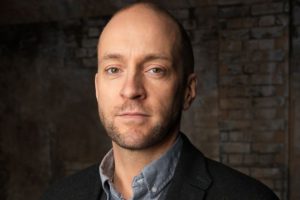Ringside Report Takes a Closer Look at Mentalist Derren Brown
 By Donald “Braveheart” Stewart
By Donald “Braveheart” Stewart
Lockdown, lowdown…
I have seen Derren Brown live, more than once. On the occasion of my middle daughter, Niamh’s 19th birthday, I went with her, and her brother to Edinburgh for the show. He has always fascinated and enthralled. His stage shows are something else.
He is a mentalist.
Apparently, Bruno Heller is also a fan.
Legend has it that he based the CBS show, the Mentalist, upon Brown, and for 7 seasons we watched this man of exceptional skills turn from being a stage trickster to a seasoned CBI agent – the Californian Bureau of Investigation. I have no idea if the tale about the inspiration for the show is right or not BUT it is a brilliant story nonetheless!
I would settle down beside my kids to watch this as often as possible as Channel Five, on terrestrial television picked it up, guaranteeing a wide British audience for it. The 151 episodes introduced Simon Baker, hitherto an unknown and it took a look at the wider offer on Sky to bring me his backstory as an actor and The Guardian.
It took researching this for me to discover he was Australian!
The premise was that former stage psychic and con artist, Patrick Jane, following the slaughter of his wife and daughter had turned his back on such falsehoods. His decision somewhat forced by the fact that their murder happened as he taunted the man responsible for it live on air. He now wanted to use his abilities of observation and manipulation for good; principally he wanted to hunt down the serial killer who killed his family – Red John.
On the way he was going to work as a consultant – think Sherlock Holmes, the original consulting detective – and you can see how his insight was to be powered into the police investigations… and welcomed!
The team around him was the love interest of Teresa Lisbon, and the healthy sceptics and supporters, Wayne Rigsby, Grace Van Pelt and Kimball Cho. By the end of the series, of the five principal characters, four of them ended up married! And we discovered who Red John was in series six.
As a narrative arc, Red John worked brilliantly, but once solved the premise began to show wear and tear. Stringing the Red John search out for any longer would have broken the threads of the story beyond believability, but if you have established a decent framework, once it has gone, the rest may creak because less attention has been paid to them.
Part of that problem, for me, was the development of the relationships that ended in matrimony as well as the somewhat lack of depth for Cho, in particular. Jane’s character had necessarily been dominant and once its major reason for attaching itself to the CBI had been resolved, there seemed less reason for following the twists and turns it enjoyed spinning. Not even the appearance of an array of highly entertaining bosses and civilians – Madelaine Hightower being a highlight – managed to save the day.
The truncated 13 episode final season was testimony to that slide.
By the end we were watching entertainment and not another example of the incisiveness of manipulation and stage theatrics that had enthralled us at the beginning. Mind you, it was pretty superior entertainment.
British television is a curious affair. Begun through the British Broadcasting Corporation (BBC) it is funded through the universal license fee. In essence, if you wanted to watch the television , you had to pay the license fee. The BBC got it all and is state run, albeit at arms-length. Then came along commercial television in the form of the Independent Television (ITV) in 1955. Designed to bring a bit of competition to the BBC, it was paid for through advertising but still free to air… well they didn’t add another license fee to it. By the time that I was born, 1965, there was BBC1, BBC2 and ITV. And that was it. It was still years before Bruce Springsteen would moan that there were 55 channels and nothing on but here in the UK, we kept this going until in 1982, we added a fourth channel and in 1997, a fifth. With sparkling imagination, they were called Channel Four and ehm Channel Five… In between came Sky and we understood what Springsteen meant. And so, my childhood and leading up to early adulthood we had three options… But the programs made were exceptionally good. And so, here is some critical nostalgia as the lockdown has brought a plethora of reruns, new formats and platforms and old classics trying to make their way back into our consciousness as broadcasters flood their schedules with classics… or are they classics at all? Let me take you through an armchair critics’ view of what we have to see, to find out… Welcome to the Lockdown Lowdown…
[si-contact-form form=’2′]

